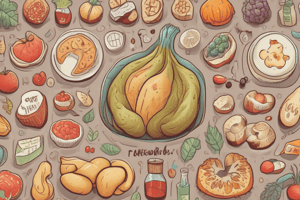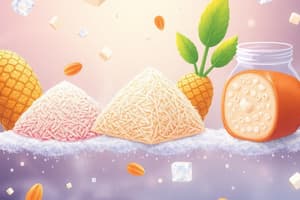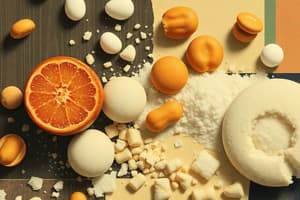Podcast
Questions and Answers
What two carbohydrates provide about half of all the energy muscles and other body tissues use?
What two carbohydrates provide about half of all the energy muscles and other body tissues use?
- Glycogen (correct)
- Galactose
- Glucose (correct)
- Fructose
What are monosaccharides?
What are monosaccharides?
Single sugars
What are disaccharides?
What are disaccharides?
Sugars composed of pairs of monosaccharides
What are polysaccharides?
What are polysaccharides?
Monosaccharides and disaccharides are sometimes called simple carbohydrates.
Monosaccharides and disaccharides are sometimes called simple carbohydrates.
Polysaccharides are sometimes called complex carbohydrates.
Polysaccharides are sometimes called complex carbohydrates.
Name a few examples of monosaccharides.
Name a few examples of monosaccharides.
Name examples of disaccharides.
Name examples of disaccharides.
Glucose is sometimes known as blood sugar.
Glucose is sometimes known as blood sugar.
What is fructose commonly known as?
What is fructose commonly known as?
What is the primary role of glycogen in the body?
What is the primary role of glycogen in the body?
Where is glucose stored in the human body?
Where is glucose stored in the human body?
Which types of polysaccharides are important in nutrition?
Which types of polysaccharides are important in nutrition?
What is the storage form of energy in plants?
What is the storage form of energy in plants?
Dietary fibers provide structure in stems, trunks, roots, leaves, and skins of plants.
Dietary fibers provide structure in stems, trunks, roots, leaves, and skins of plants.
What are soluble fibers known for?
What are soluble fibers known for?
What are insoluble fibers known for?
What are insoluble fibers known for?
What do resistant starches do?
What do resistant starches do?
What is glycobiology?
What is glycobiology?
What is gluconeogenesis?
What is gluconeogenesis?
Type 1 diabetes is where the pancreas fails to produce insulin.
Type 1 diabetes is where the pancreas fails to produce insulin.
Type 2 diabetes is where the cells fail to respond to insulin.
Type 2 diabetes is where the cells fail to respond to insulin.
What is hypoglycemia?
What is hypoglycemia?
Flashcards are hidden until you start studying
Study Notes
Carbohydrates Overview
- Carbohydrates include sugars, starches, and fibers, serving as a primary energy source for the body.
- Glucose and glycogen contribute to roughly half of the energy used by muscles and body tissues.
Types of Carbohydrates
- Monosaccharides: Basic single sugar units (e.g., glucose, fructose, galactose).
- Disaccharides: Combinations of two monosaccharides (e.g., maltose, sucrose, lactose).
- Polysaccharides: Large molecules formed from chains of monosaccharides, encompassing starches and fibers.
Characteristics of Sugars
- Monosaccharides and disaccharides are referred to as simple carbohydrates.
- Polysaccharides are known as complex carbohydrates.
Important Monosaccharides
- Glucose: Known as blood sugar, it has a mild sweetness.
- Fructose: Known as fruit sugar, it's intensely sweet and found in fruits and honey.
- Galactose: Mildly sweet and contributes to lactose in milk.
Key Polysaccharides
- Starch: Principal energy source for the global population; stored energy form in plants.
- Glycogen: Main energy storage form in the human body, primarily in the liver and muscle cells.
- Fibers: Provide structural integrity in plants and are not digestible by human enzymes.
Dietary Fibers
- Non-starch polysaccharides: Make up dietary fibers present in all plant-based foods.
- Soluble fibers: Dissolve in water, form gels, and are fermentable; found in oats, legumes, and fruits.
- Insoluble fibers: Do not dissolve and promote bowel health; found in whole grains and vegetables.
Special Types of Starches
- Resistant starches: Undigested in the small intestine; found in partially milled grains, legumes, and chilled cooked potatoes.
Additional Components
- Phytic acid: Found in grain husks and binds minerals but is not classified as dietary fiber.
- Available carbohydrates: Starches and sugars broken down by digestive enzymes for energy.
- Unavailable carbohydrates: Fibers that remain undigested due to the inability of human enzymes to break down their bonds.
Biochemical Processes
- Glycobiology: Study of sugars and their biological roles.
- Gluconeogenesis: Conversion of protein to glucose, providing a new source of glucose.
- Protein-sparing action: Adequate carbohydrate intake prevents protein from being used as an energy source.
Health Implications
- Type 1 diabetes: Characterized by the pancreas's failure to produce insulin.
- Type 2 diabetes: More common type where cells are resistant to insulin.
- Hypoglycemia: Result of poorly managed diabetes leading to excessive insulin levels.
Studying That Suits You
Use AI to generate personalized quizzes and flashcards to suit your learning preferences.




